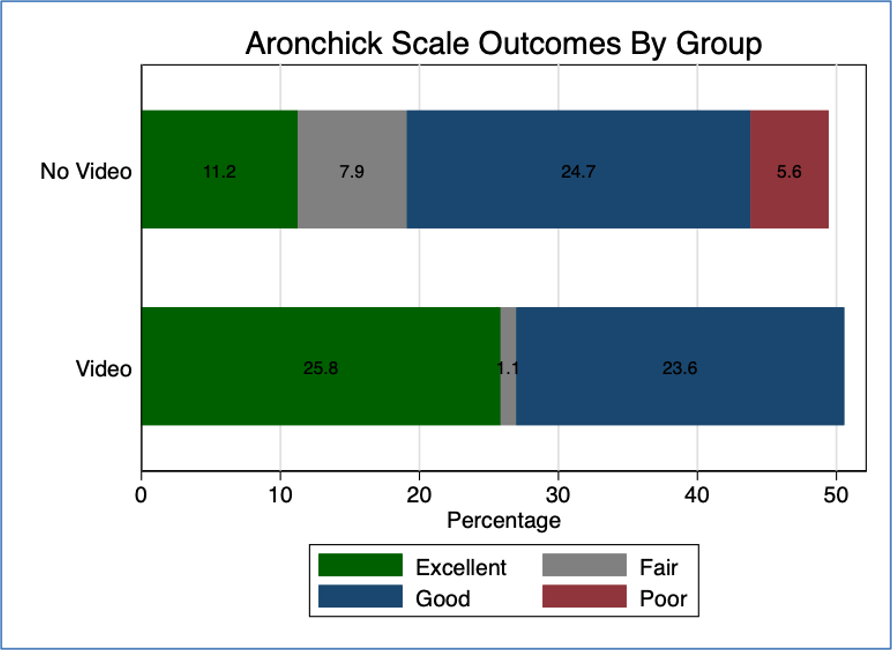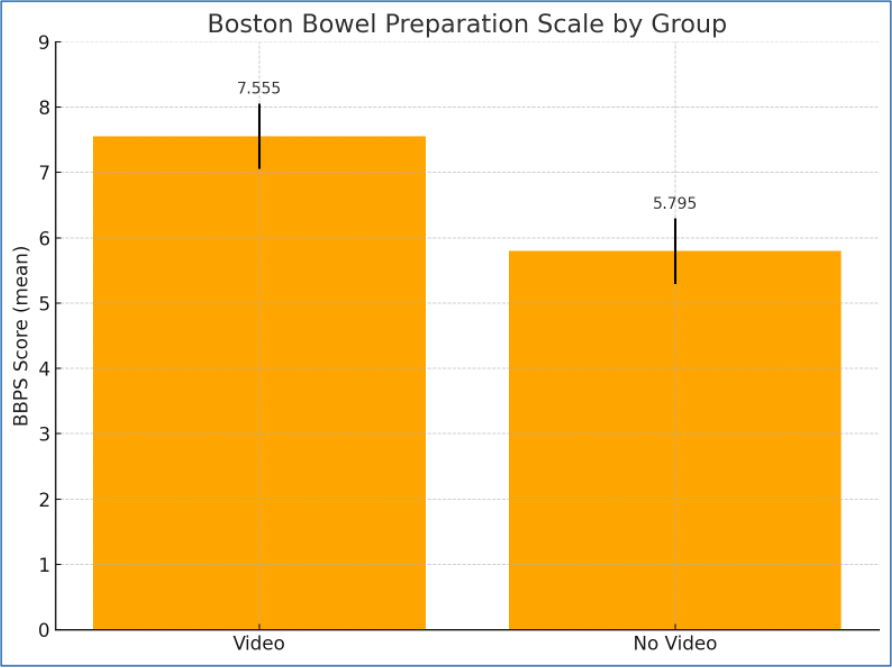Tuesday Poster Session
Category: Colorectal Cancer Prevention
P4790 - Bridging Language Gaps to Improve Colonoscopy Prep: A Multilingual Video Approach in a County Hospital Setting
Tuesday, October 28, 2025
10:30 AM - 4:00 PM PDT
Location: Exhibit Hall

Lexi Luong, MD (she/her/hers)
1. Department of Internal Medicine, Highland Hospital, Oakland, CA, USA
Oakland, CA
Presenting Author(s)
Lexi Luong, MD1, Alyssa Caplan, MD2, Thanh Nguyen, MD1, Toby M. Bradford, MD3, Benny Liu, MD4, Taft Bhuket, MD4, Christina Chou, MD5
11. Department of Internal Medicine, Highland Hospital, Oakland, CA, USA, Oakland, CA; 2Section of Gastroenterology, California Pacific Medical Center, San Francisco, CA, United States., Oakland, CA; 3Mather Hospital, Zucker School of Medicine at Hofstra University, Ronkonkoma, NY; 4Alameda Health System, Oakland, CA, United States., Oakland, CA; 5Alameda Health System, Oakland, CA
Introduction: Successful bowel preparation is crucial for high-quality colonoscopy, influencing adenoma detection rates (ADR) and colorectal cancer prevention. Language barriers and limited health literacy often lead to inadequate prep quality in diverse patient populations. This study examines the effect of a language-specific educational video on prep quality, patient comprehension, and satisfaction.
Methods: We conducted a case-control study at a multilingual safety-net county hospital, enrolling 90 adults scheduled for outpatient colonoscopy. Participants received a text message before their procedure linking to an instructional video on how to properly perform colonoscopy prep in their preferred language (English, Spanish, Tagalog, Vietnamese, Chinese, or Korean). The intervention group (n=45) viewed the video, while the control group (n=45) did not. Prep quality was evaluated during colonoscopy using the Boston Bowel Preparation Scale (BBPS) and Aronchick scale. On arrival, participants completed a survey assessing anxiety levels and the video’s helpfulness.
Results: Those who viewed the language-specific video had higher average BBPS scores than controls (7.55 vs. 5.70, p < 0.01), reflecting better prep quality. Using the Aronchick Scale, the video group showed higher rates of excellent prep (26% vs. 11%) and fewer poor-quality preps (0% vs. 6%). Satisfaction was high among video viewers: 90% felt completely relaxed in regards to undergoing colonoscopy, 88% found the video helpful for dietary instructions, and 100% would recommend the video to others. The intervention was effective across multiple languages and cultural groups.
Discussion: Our findings demonstrate that language-specific, culturally sensitive video education significantly improves bowel prep quality and enhances patient experience. Patients across various language and ethnic backgrounds showed higher satisfaction, improved BBPS scores, and better prep quality with this approach. Delivered via text message, this intervention is cost-effective, scalable, and ideal for safety-net hospitals serving diverse populations. Incorporating multilingual video education prior to colonoscopy may reduce disparities and improve procedural outcomes in underserved communities.

Figure: Boston Bowel Preparation Scale by Group

Figure: Aronchick Scale Outcomes By Group
Disclosures:
Lexi Luong indicated no relevant financial relationships.
Alyssa Caplan indicated no relevant financial relationships.
Thanh Nguyen indicated no relevant financial relationships.
Toby Bradford indicated no relevant financial relationships.
Benny Liu indicated no relevant financial relationships.
Taft Bhuket indicated no relevant financial relationships.
Christina Chou indicated no relevant financial relationships.
Lexi Luong, MD1, Alyssa Caplan, MD2, Thanh Nguyen, MD1, Toby M. Bradford, MD3, Benny Liu, MD4, Taft Bhuket, MD4, Christina Chou, MD5. P4790 - Bridging Language Gaps to Improve Colonoscopy Prep: A Multilingual Video Approach in a County Hospital Setting, ACG 2025 Annual Scientific Meeting Abstracts. Phoenix, AZ: American College of Gastroenterology.
11. Department of Internal Medicine, Highland Hospital, Oakland, CA, USA, Oakland, CA; 2Section of Gastroenterology, California Pacific Medical Center, San Francisco, CA, United States., Oakland, CA; 3Mather Hospital, Zucker School of Medicine at Hofstra University, Ronkonkoma, NY; 4Alameda Health System, Oakland, CA, United States., Oakland, CA; 5Alameda Health System, Oakland, CA
Introduction: Successful bowel preparation is crucial for high-quality colonoscopy, influencing adenoma detection rates (ADR) and colorectal cancer prevention. Language barriers and limited health literacy often lead to inadequate prep quality in diverse patient populations. This study examines the effect of a language-specific educational video on prep quality, patient comprehension, and satisfaction.
Methods: We conducted a case-control study at a multilingual safety-net county hospital, enrolling 90 adults scheduled for outpatient colonoscopy. Participants received a text message before their procedure linking to an instructional video on how to properly perform colonoscopy prep in their preferred language (English, Spanish, Tagalog, Vietnamese, Chinese, or Korean). The intervention group (n=45) viewed the video, while the control group (n=45) did not. Prep quality was evaluated during colonoscopy using the Boston Bowel Preparation Scale (BBPS) and Aronchick scale. On arrival, participants completed a survey assessing anxiety levels and the video’s helpfulness.
Results: Those who viewed the language-specific video had higher average BBPS scores than controls (7.55 vs. 5.70, p < 0.01), reflecting better prep quality. Using the Aronchick Scale, the video group showed higher rates of excellent prep (26% vs. 11%) and fewer poor-quality preps (0% vs. 6%). Satisfaction was high among video viewers: 90% felt completely relaxed in regards to undergoing colonoscopy, 88% found the video helpful for dietary instructions, and 100% would recommend the video to others. The intervention was effective across multiple languages and cultural groups.
Discussion: Our findings demonstrate that language-specific, culturally sensitive video education significantly improves bowel prep quality and enhances patient experience. Patients across various language and ethnic backgrounds showed higher satisfaction, improved BBPS scores, and better prep quality with this approach. Delivered via text message, this intervention is cost-effective, scalable, and ideal for safety-net hospitals serving diverse populations. Incorporating multilingual video education prior to colonoscopy may reduce disparities and improve procedural outcomes in underserved communities.

Figure: Boston Bowel Preparation Scale by Group

Figure: Aronchick Scale Outcomes By Group
Disclosures:
Lexi Luong indicated no relevant financial relationships.
Alyssa Caplan indicated no relevant financial relationships.
Thanh Nguyen indicated no relevant financial relationships.
Toby Bradford indicated no relevant financial relationships.
Benny Liu indicated no relevant financial relationships.
Taft Bhuket indicated no relevant financial relationships.
Christina Chou indicated no relevant financial relationships.
Lexi Luong, MD1, Alyssa Caplan, MD2, Thanh Nguyen, MD1, Toby M. Bradford, MD3, Benny Liu, MD4, Taft Bhuket, MD4, Christina Chou, MD5. P4790 - Bridging Language Gaps to Improve Colonoscopy Prep: A Multilingual Video Approach in a County Hospital Setting, ACG 2025 Annual Scientific Meeting Abstracts. Phoenix, AZ: American College of Gastroenterology.

